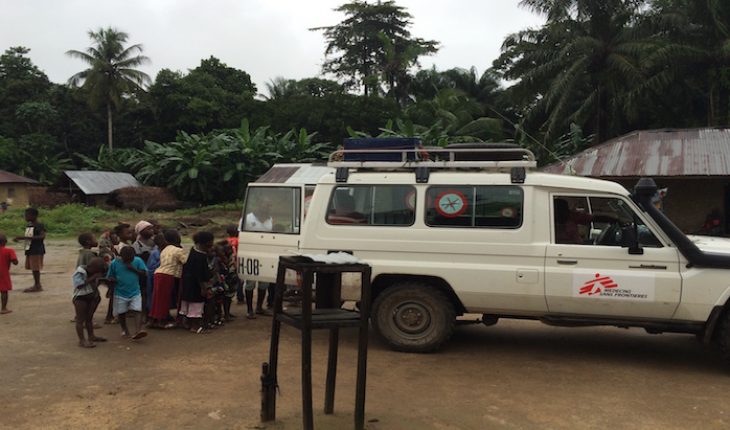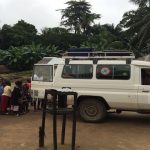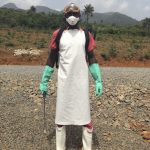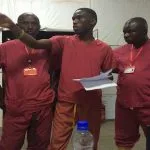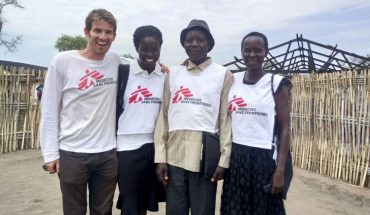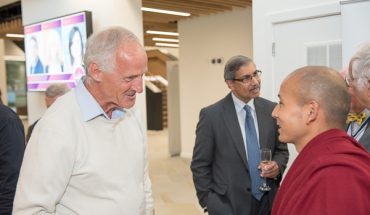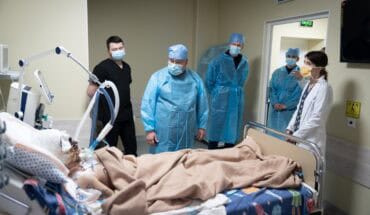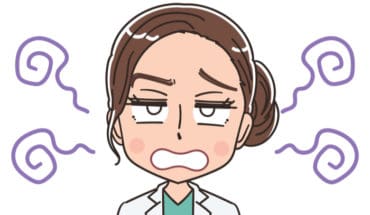Samantha Roper, 30, is training to be a paediatrician in London. For the last two years, she has also been working in Africa on humanitarian missions for various charities, including a stint as a medical team leader for Medicin Sans Frontieres in Sierra Leone running a survivors clinic for Ebola victims.
Ebola is a pretty terrifying disease because it is so deadly, and even survivors never seem to be able to shake it off. The Scottish nurse Pauline Cafferkey who was flown out of Sierra Leone suffering from Ebola symptoms shortly after I arrived in the country, is still suffering relapses now, even after she has been successfully treated.
One of the strangest long-term complications caused by the Ebola virus is iritis, or inflammation of the iris in the eye. When I was staffing a survivors’ clinic, I saw an American doctor whose eyes changed from brown to blue after he contracted Ebola.
It was just one of the weird side-effects which haunted victims long after they were apparently clear of the disease, all because Ebola can hide in parts of the body which are ‘protected’ from the immune system, including the inside of the eyeball. The virus lies dormant in these secret places and can re-emerge, many months after treatment has finished. In the case of Pauline Cafferkey, the virus had probably hidden in her cerebral fluid, remerging to cause symptoms of meningitis-inflammation of the meninges around the brain.
It was very scary treating people with Ebola because not only was it such a deadly infectious disease, but once caught, it was hard to eradicate completely.
I have always wanted to help people in crisis, ever since I was a little girl. I remember watching TV news programmes about starving children in places in Africa and I felt I had to grow up and do something to help. Becoming a doctor was just a way to reach my goal route to becoming a humanitarian aid worker. I’ve worked in the townships in South Africa looking after maternal and child health and in Kenya as well as in Sierra Leone.
Sierra Leone was one of my most challenging assignments. As well as Pauline, another army nurse was infected soon after I arrived in a nearby clinic where the British military were running a clinic for health workers.
But despite the fear, I had to get on with the job in hand which was initially managing a clinic for Save The Children. There were just a handful of doctors trying to deal with this huge crisis and our shifts were 12 hours on, 12 hours off. The situation was made even worse because a disproportionately large number of doctors and nurses lost their lives in the Ebola outbreak because so many of them were trying to help with minimal equipment. Doctors had to provide their own sterile gloves and did not get proper contamination suits until long after the outbreak started. And at the beginning, a lot of people did not know what the disease was and there was a lot of cross-infection.
I was only able to run the clinic for six weeks – that was considered the maximum time we could cope without becoming over tired or complacent about our safety. After that, people did start to cut corners when it came to the hygiene measures.
After that, Medicins Sans Frontieres asked me to set up a survivors’ clinic. It was such a huge outbreak that there was a large number of survivors, for the first time. In the past, the disease had been more localised and had killed the vast majority of people who were infected.
What we quickly found was that around 80-90 per cent of survivors had severe pain in their joints which meant that they could not return to work. We still don’t know why so many have joint pains although it may be due to inflammation caused by the virus. Many survivors suffered from cataracts that lead to blindness. We are worried that it can be passed on through infected semen many months after someone had apparently recovered from the disease.
The other victims of the Ebola outbreak have been children who have not received proper medical care because all the medical resources have been diverted. The health service in Sierra Leone was already severely underfunded. Now it is practically non-existant. Mothers, understandably, are also terrified to take their children to hospitals and clinics where so many Ebola victims passed on the infection to others.
I would like to work for MSF as paediatrician in future when I finish my training and eventually I would like to get more involved with policy. It can be very frustrating to work for NGOs when there is no overarching organisational structure, poor resources and lack of communication between different groups who are trying to help. I would like to help create a much more coordinated approach to disaster relief and use my experience to ensure that we can tackle problems like Ebola on a truly united front.
- MSF’s outreach survivor clinic, Tonkolili District
- Sierra Leonean staff, Kerrytown Ebola Treatment Centre
- Community Health Officers on duty in Kerrytown’s Ebola treatment centre
Find out more about Médecins Sans Frontières work in Sierra Leone
To make a donation to MSF please click here.
- Ebola – hiding in eyeballs - 15th April 2016

